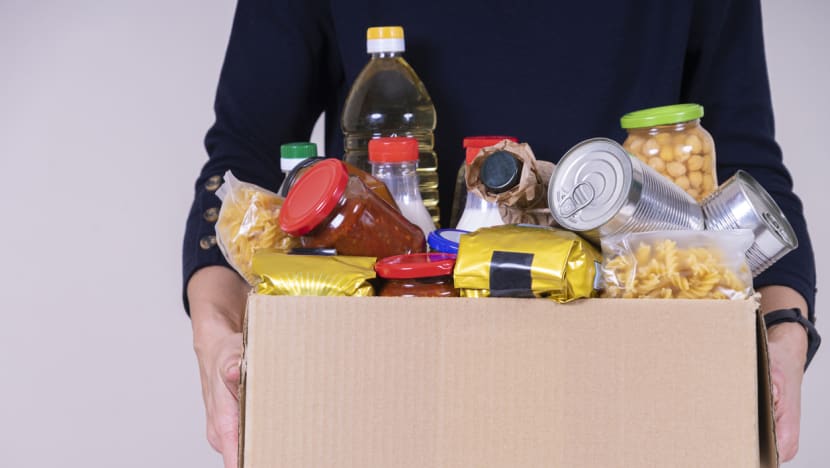Commentary: Don’t throw out all foods just because they’ve expired
Food expiry dates are not created equal – some should be strictly followed, while others not necessarily so, say researchers from the NUS Department of Food Science and Technology.

File photo of a box of food items. (Photo: iStock/vejaa)
SINGAPORE: Have you ever thrown away your favourite snack because it was past its expiry date? What would happen if you ate it just one day after it expired?
Food waste is one of Singapore’s largest waste streams. Half of household food waste can be avoided, with rice, noodles and bread being the most commonly thrown out.
But it’s not always necessary to throw food out after their expiry dates. UK supermarket chain Waitrose, for instance, has scrapped “best before” dates from fresh produce in an effort to slash food waste.
There are ways to discern whether something past expiry is safe to eat, instead of discarding it by default.
"USE BY" VERSUS "BEST BEFORE" DATES
Microorganisms are everywhere on our planet, including our food. Only a very small proportion of the microorganisms in food can make people sick; they are referred to as pathogens.
When pathogens contaminate food through channels like irrigation water or the food processing environment, they tend to be present in low numbers. They typically don’t make any visible changes to the taste, smell or appearance of foods.
Pathogens have a very low infectious dose, meaning once they are there, only a few cells are needed to make you sick. The more pathogens you consume, the sicker you may become.
Perishable foods such as dairy and meat provide good conditions for microbial growth because they are high in water content and nutrients. Pathogens may reach much higher levels closer to expiry dates.
Microbial spoilage and safety are the leading considerations when determining the expiry of perishable foods, which is typically denoted as “use by” as opposed to “best before”.
Drinking from a carton of fresh milk or nibbling on a piece of cheese several days past a “use by” date is thus a bad idea. Expired perishable food may also be unfit for consumption even after cooking or re-heating in the microwave, as there may be heat-stable toxins that will not be inactivated and subsequently make you sick.
On the other hand, products such as cereal and biscuits contain low moisture, so do not support the growth of most microorganisms. For such foods, product quality like loss of aroma or changes in taste or texture, rather than food safety, is the leading consideration when determining expiry, typically denoted as “best before”.
While no food is ever 100 per cent safe to eat, the risk of eating something after its “best before” date isn’t significantly higher than eating it before. A pack of breakfast cereal that is a week past expiry is generally fine for consumption, as long as you still find it yummy.
EXPIRY DATES AREN’T THE BE-ALL AND END-ALL
How you’ve kept the food also matters in whether it’s safe to eat.
A pack of chicken breast that you forgot to put in the refrigerator after getting home from the grocery store would be smelly and slimy the next morning. It would be practically inedible even if the “use by” date is one or two days away.
Likewise, a bottle of beer with a loose cap will become rancid and sour even though the “best before” date may be months away.
In all these instances, factors such as improper storage, compromised packaging and microbial contaminants have taken precedence over expiry in determining if a given food is still fit for consumption.
So can you eat expired foods?
Like most things in life, the answer is never black or white. It is judicious to follow the manufacturer’s instructions as expiry dates assume optimal storage conditions.
This is especially applicable to perishable foods. Dairy products, fresh meat, seafood, and cooked or packed food meant for immediate consumption all fall in this category.
Less perishable food with “best before” dates is where opportunities to reduce food wastage abound. If it still looks, smells and tastes fine overall, quickly consume it rather than blindly following the expiry date and throwing away perfectly edible food.
Dried uncooked pasta, uncooked rice, dried noodles, biscuits, cereals, preserved fruits and meat, to name a few, fall in this category.
Zwe Ye Htut is Research Fellow and Li Dan is Assistant Professor at the Department of Food Science and Technology, Faculty of Science, National University of Singapore.




















